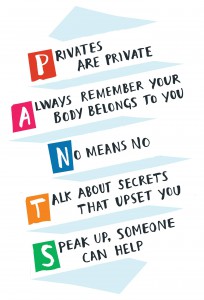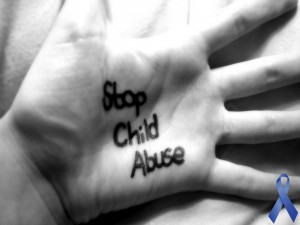We all have personal likes and things that make us uncomfortable. “Personal space” is the private area of control inside an imaginary line or boundary that defines each person as separate. Ideally, that boundary helps us stay in charge of our own personal space. It helps keep out the things that make us uncomfortable – unsafe and  unwanted feelings, words, images, and physical contact. Solid social rules strengthen the boundary. Behaviors that routinely disrespect or ignore boundaries make children vulnerable to abuse.
unwanted feelings, words, images, and physical contact. Solid social rules strengthen the boundary. Behaviors that routinely disrespect or ignore boundaries make children vulnerable to abuse.
Do you know an adult or older child who doesn’t seem to understand what’s acceptable when it comes to:
Personal Space
- Makes others uncomfortable by ignoring social, emotional or physical boundaries or limits?
- Refuses to let a child set any of his or her own limits? Uses teasing or belittling language to keep a child from setting a limit?
- Insists on hugging, touching, kissing, tickling, wrestling with or holding a child even when the child does not want this physical contact or attention?
- Frequently walks in on children/teens in the bathroom?
Relationships with Children
- Turns to a child for emotional or physical comfort by sharing personal or private information or activities, normally shared with adults?
- Has secret interactions with teens or children (e.g. games, sharing drugs, alcohol, or sexual material) or spends excessive time to emailing, text messaging or calling children or youth
- Insists on or manages to spend uninterrupted time alone with a child?

- Seems “too good to be true,” i.e. frequently baby sits different children for free; takes children on special outings alone; buys children gifts or gives them money for no apparent reason?
- Allows children or teens to consistently get away with inappropriate behaviors?
Sexual Conversation or Behavior
- Frequently points out sexual images or tells dirty or suggestive jokes with children present?
- Exposes a child to adult sexual interactions or images without apparent concern?
- Is overly interested in the sexuality of a particular child or teen (e.g., talks repeatedly about the child’s developing body or interferes with normal teen dating)?